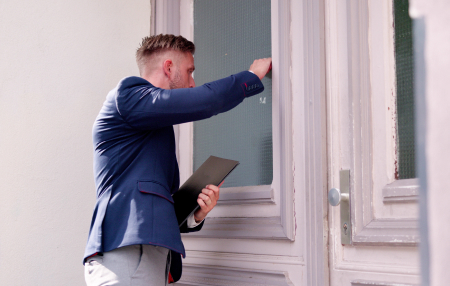
When you’re dealing with significant debt, things can quickly become overwhelming. Day-to-day tasks can become more stressful and life can be made especially daunting if you’re also being faced with the prospect of bailiffs knocking on your door. Employed by creditors to recover unpaid debts, the thought of these collection agents turning up at your home has the ability to evoke both fear and uncertainty. But what do bailiffs actually have the power and legal authority to do and how should you deal with them?
From looking at what bailiffs are and what circumstances they can legally enter your home, to exploring which items they can repossess and what you can do to stop them, in this guide we take a deep dive into the relationship between debtors and bailiffs.
What is a bailiff?
First things first – before looking at how they operate and what can be done to stop them, it’s important to understand what bailiffs actually are. Simply put, a bailiff is an individual or agency authorised by a court or creditor to collect the outstanding debts you might owe. Bailiffs can be employed by a number of different parties, including private creditors, local authorities (if you’re in significant council tax debt), and HM Revenue and Customers (HMRC).
In theory, these court-empowered enforcement officers have the legal authority to seize personal possessions and assets in order to recover the outstanding debt they are responsible for collecting.
Can a bailiff force entry?
Contrary to belief, the majority of bailiffs typically cannot force entry into your home. While it’s true that certain types of debts—such as unpaid council tax or criminal fines—do not allow bailiffs the right to force entry by asking a locksmith to open your door if you won’t grant access, this is fairly unusual.
It’s important to note that the bailiff’s power to act is limited in certain circumstances. Residents should inform any attending bailiff of the age of those present at the property and if anyone is vulnerable as this may restrict what the bailiff can do.
Bailiffs may not attempt entry if those present are either vulnerable or not older than 16, and they may not direct questions to those under 12. Vulnerability can take many forms and can cover a range of different situations. For example, if you or a family member are disabled, are seriously ill, are struggling with mental health, or are pregnant/looking after small children.
As a rule, the only specific circumstances a bailiff is allowed to force entry into your home are when they are retrieving outstanding court-issued fines, collecting debts on behalf of HM Revenue & Customs, including income tax or VAT, or revisiting a property where peaceful entry has been previously granted.
Remember – if a bailiff attempts to forcibly enter your home without valid grounds such as a court-issued warrant, it’s your legal right to ask them to leave.
What can bailiffs take?
Bailiffs are entitled to seize assets belonging to the debtor in order to cover the value of the outstanding debt in question. However, it’s essential to understand that all bailiffs must follow certain rules when collecting a debt. This is to say, there are items they are permitted to take and those, typically essential items and assets, they are not allowed to take from your home.
In practice, this means bailiffs try to operate with a focus on practicality rather than punishment. They will only seize valuable items that can be sold at auction to meaningfully alleviate your debt. Interestingly, as a rule their authority typically only extends to tangible items they can locate and physically remove. This means, if a bailiff does not access your home but can see valuable assets through goods through a window, for example, they are not typically allowed to include these items in their control order.
Indeed, while items seen through a window can be included, this is not enforceable if an agreement has not been signed. Bailiffs can, in theory at least, force entry to seize these goods if they have already gained peaceful entry, which could be via an unlocked door, previously.
With their primary aim being the retrieval of valuable assets suitable for auction, bailiffs tend to focus on items such as motor vehicles, electronic devices, jewellery, and furnishings. It’s important to note that if you share a home with a partner or other individuals, assets owned by them cannot be seized. Bailiffs can only seize items owned by the debtor.
However, that being said, the responsibility to provide evidence that items found in their home belong to another person lies with the debtor. Evidence could include hire purchase agreements, receipts, or bank statements. If a bailiff does seize assets belonging to a third party, either the debtor or the third party can file a complaint with the bailiff’s company for the return of the items. A complaint process is available online through the Justice section of GOV.UK.
Can bailiffs refuse a payment plan?
If you are dealing with bailiffs, the quickest way to get rid of them is to repay the debt owed. This can be done by either paying a lump sum or agreeing on a payment plan of weekly or monthly payments with your creditor.
However, bailiffs do have the authority to decline a proposed payment arrangement and may opt to reject negotiation efforts altogether. Typically, refusals tend to happen when the bailiff does not believe you will be able to afford proposed terms, or if the amount you are offering to pay each month is not considered sufficient enough to start clearing your debt. However, while bailiffs do have the authority to accept or refuse such arrangements, they are generally encouraged to work with debtors to reach a mutually acceptable solution.
How to stop bailiffs
If you’re facing imminent bailiff action due to significant debt, there are a number of steps you can look at taking to prevent the situation from escalating. Your first port of call should be to contact your creditors. By doing this and explaining your situation, you may be able to negotiate a manageable repayment plan that will see you pay smaller monthly payments. If your creditor agrees to a payment plan and you keep up with your new payments, no bailiff action should occur.
It can also be a good idea to seek professional debt advice to talk over your situation. Organisations like Citizens Advice Bureau and MoneyHelper can provide free, valuable advice and guidance.
Finally, if you are unable to pay your debts and are unable to agree on a payment plan with your creditors yourself, you might wish to consider a debt management solution to stop bailiffs. For example, a professional debt management plan (DMP) could allow you to consolidate debts into affordable monthly payments.
In the majority of cases, DMPs can also protect against bailiffs, debt collectors and even court action. Similarly, Individual Voluntary Arrangements (IVAs) and Debt Relief Orders (DROs) are alternative formal arrangements that can provide legal protection from bailiffs while facilitating debt repayment based on affordability.
To explore these options further, get free debt management advice by visiting MoneyHelper or get in touch with us to find out more about our debt management solutions.

